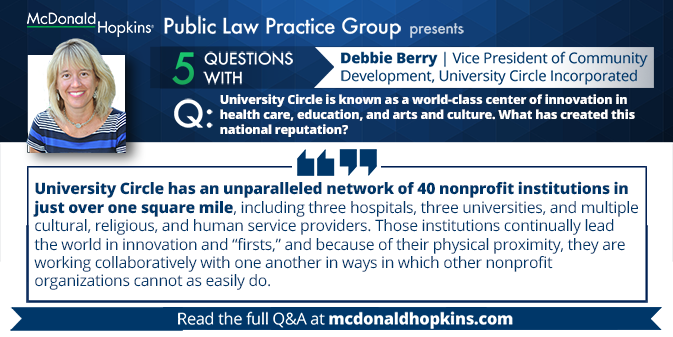To our friends, clients and colleagues in local and regional government, local and higher education, and the nonprofit sector, welcome to our latest Monday Message from the Public Law Group at McDonald Hopkins. In today’s email, assembled by attorneys Teresa Metcalf Beasley and Kevin Butler, you’ll find insights into areas of law we’re watching on your behalf.
In today’s edition:
- In our monthly segment, ‘5 Questions With’ Debbie Berry, University Circle Inc.’s Vice President of Community Development
- Ohio expands shoreline erosion protection measures to inland waterways
- Ison v. Madison Local Sch. Dist. Bd. of Educ.: Sixth Circuit offers a primer on regulation of citizen speech at public meetings
In our monthly segment, ‘5 Questions With’ Debbie Berry, University Circle Inc.’s Vice President of Community Development

In today’s edition of the Monday Message, we’re excited to continue our series, “5 Questions With” – a monthly segment in which we ask local, regional and statewide leaders to pass along their wisdom on items of current and lasting interest, all in a brief, easy-to-read format.
For our latest installment we’ve reached out to Debbie Berry, Vice President of Community Development at University Circle Inc. – the engine that powers, in her words, a thriving “network of 40 non-profit institutions in just over one square mile, including three hospitals, three universities, and multiple cultural, religious, and human service providers.” Berry’s historic focus has been on real estate development and providing “Complete Neighborhood” amenities to the area’s residents – and she shows her mettle in today’s Q&A. “Once people started to move in [to the nearly 2,000 residential units UCI championed], they wanted nearby services and amenities,” Berry writes. “We met this demand by enhancing our retail with more local restaurants, a drug store, and a grocery store. We have also been focused on improving greenspaces and making better connections throughout the district so that people can safely walk, bike, or take transit instead of needing to get in their cars and drive.”
Berry also looks ahead to post-pandemic University Circle programming and fundraising, and to the next City Hall administration, with a plea to overhaul the online permitting process and make the city website more user-friendly. Read more insights from Berry here.
Ohio expands shoreline erosion protection measures to inland waterways
Through the efforts of our Government Relations team, which worked with and is grateful to Rep. Jamie Callendar and Sen. Matt Dolan, the Ohio General Assembly has expanded the ability for property owners to join special self-assessing districts for the purpose of controlling shoreline erosion – even if their “shorelines” are far away from Lake Erie. This means Ohio property owners struggling with erosion issues along the state’s many streams and rivers will now have the same financing tool that is available to lakefront owners, one that’s off-balance-sheet and does not follow the homeowner once the property is sold.
You can read more about our work at the leading edge of Ohio’s very first Erosion Control Special Improvement Districts here. The newly expanded reach of Erosion Control SIDs was included in the state operating budget signed by Gov. DeWine on June 30. We had mentioned our efforts to seek legislative support for broadening this popular financing mechanism three weeks earlier in a webinar on the subject, facilitated by our colleagues Amanda Gordon and Mike Wise. Here’s a link to the webinar if you missed it.
Ison v. Madison Local Sch. Dist. Bd. of Educ.: Sixth Circuit offers a primer on regulation of citizen speech at public meetings
School boards, city and village councils, township trustees and other deliberative bodies in Ohio may wish to consult a case just handed down by the Sixth Circuit setting parameters around public comment at open meetings. In Ison v. Madison Local Sch. Dist. Bd. of Educ., the court last week determined that an Ohio school board’s guidelines for public comment, which prohibited “abusive,” “personally directed,” and “antagonist” comments by members of the public, violated the First Amendment’s protection of free speech.
When public comment sessions are allowed at meetings, the court found, they are limited public forums under First Amendment jurisprudence, which subjects any restrictions on comment to heightened scrutiny and forbids a public body from engaging in “viewpoint discrimination” – a type of restriction on free speech that permits some private speech on a subject but “disfavors certain points of view.” The court found that each of the “antagonistic,” “abusive” and “personally directed” public-comment restrictions were forms of impermissible viewpoint discrimination since by definition “they prohibit speech purely because it disparages or offends.”
While it struck down those content-based restrictions on public comment, the court upheld the school board’s mandate that citizen speakers register two days before the meeting in order to be heard, deeming that requirement to be a content-neutral, narrowly tailored, permissible restriction on speech. And for those worried that the court has now given its imprimatur to abusive behavior at public meetings, the Sixth Circuit in its opinion at least preserved the right of board chairs to thwart purely ad hominem attacks and to enforce “reasonable decorum” at meetings, no matter how elusive it may be to define that term.
Read the Ison case here, and let any one of us know if we can assist you in reviewing and perhaps revising your public-comment guidelines lest you face a similar First Amendment challenge.
Feel free to contact any member of the McDonald Hopkins Public Law team if you have questions or need assistance on any of the matters we’ve covered above or with your legal needs in general.
Teresa Metcalf Beasley
Chair, Public Law